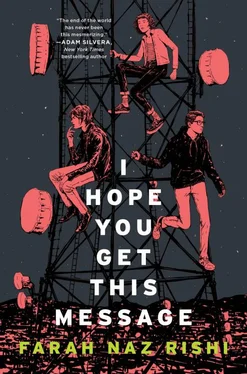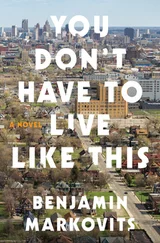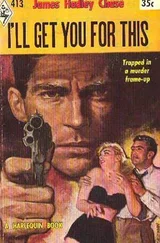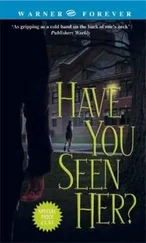Derek let out a long exhale.
“Sooo yeah, as you can see, we’re all going to die, probably.” Adeem kept his voice light, but all day, his stomach had hurt like he was stuck in free fall. In a way, he was.
Derek swallowed. “What else are people saying?”
Adeem moved the cursor farther across the lines of sound recording.
His speakers let out another crackle of static, and then, at 2438 kHz: “Think about it, how are we supposed to fight these things when we have no way of knowing how they’ll get here? What if they don’t need to get here? With the technology required to send a message that fast in the first place, they could use lasers—”
Click.
4082 kHz: “This is the BBC World Service, and as promised, we’ll be counting down the next seven days with the seminal classic Danse Macabre by Camille Saint-Saëns…”
Click.
1020 kHz: “When whatever you want to do cannot be done,” a woman’s voice began, “When nothing is of any use; —At this hour when night comes down, When night comes, dragging its long face, dressed in mourning, Be with me, My tormenter, my love, be near me.”
Her voice faded to static. Adeem was supposed to shift the cursor again to the next spike in the waveform, but instead, he yanked his hand away from his keyboard as if it’d bitten him.
That voice. That poem.
It’d been one of her favorites, an Urdu poem—Dad had introduced her to it. They would recite it to each other, back when they were still learning Urdu, and she’d teased Adeem for his clumsy pronunciation. “How can you be so good at computer languages but suck so bad at your mother tongue?” she’d said, throwing her head back and laughing.
“Adeem?” Derek asked.
Adeem couldn’t stop shaking. He was so cold, his blood making a hasty retreat from his head. His ears throbbed with his frantic heartbeat. Derek’s voice sounded so far away.
Where? Where was it coming from?
Be near me.
He grabbed the notebook he’d filled with frequencies. No shortwave radio frequency operated twenty-four hours, so more often than not, Adeem wouldn’t hear anything—at least, not until the revival of all the dead channels. So he’d filled the notebook with stations he’d pinpointed locations for, or ones that had identified themselves with call signs; it made it easier to track time zones, so he’d known exactly when to tune in to hear something.
His glasses drooped as he flipped a couple pages in his notebook. 1020, 1020 …
Seconds dragged on and his heart wouldn’t calm down, bursting at the seams with a delicate hope, a longing that made it hard to breathe.
His fingers ran down the column of numbers before finally landing on a location.
Roswell.
“You okay?” Derek was squinting at him.
“Yeah,” Adeem managed to say. “Yeah. Fine.”
Of all the places in the world she could be, why would she chose Roswell , the weird little town filled with aliens and superstitions? Roswell had always been a joke.
But it wasn’t so funny now.
He was sure of it, though. He knew that voice. It was deeper than he remembered, breathier even, a voice drifting like cirrus between his ears. With every day that had passed these two long years since she’d left, he’d been so afraid he’d forget. But no, he would always know that voice, more familiar to him than his own—how could he forget?
How could he ever forget his sister’s voice?
The sun was lingering just behind the top of the giant oak trees that bordered the backyard by the time the garage rumbled open. The twilight gloom made everything blurry, dreamlike. Lately, even during those rare evenings when he and his parents were home together, a bleak and hollow silence remained, as though when Leyla had left, she had taken the sound with her.
Now, though, the quiet especially stung. After Derek left, he’d sent countless ham radio transmissions back to the Roswell channel, only to get no response. Which meant the message was just a prerecording, a mirage of his sister he couldn’t quite reach.
His dad finally walked into the kitchen, limping, clutching a single grocery bag. He looked exhausted.
“What happened?” asked Adeem. He was surprised by the force of his own relief. He was used to being alone, but it was good to see his parents back in one piece. He needed to research nearby fallout shelters to make sure his mom and dad stayed that way. Though, knowing them, they’d spend the next six or so days at the mosque. Praying.
His mom trailed in now, throwing her purse angrily onto the countertop. “Hell is other people—that’s what happened.”
His dad chuckled weakly. “People were acting like animals at Costco, fighting over every little thing.” So much for armed guards. “I sprained my ankle trying to grab some bottles of water from some guy in a foil hat. Your mom had to beat some guy off me with her purse.” His dad fell into a chair at the dining table. “There wasn’t much left.”
It was an understatement. His parents had only managed to get a few cans of nonperishables, a few rolls of toilet paper. Powdered milk packets, which Adeem made a face at. The water bottles, apparently, hadn’t made it home.
“Will that be enough?” Adeem asked. Enough for what , exactly, he wasn’t even sure.
“We’ll be okay,” his dad said.
We’ll be okay. Adeem felt a vein throb beneath his brow. Did “we” include his sister?
Adeem took a deep breath. “What about Leyla?”
His question brought an instant chill. The awkward tension in the air was so palpable, Adeem could have plucked a blob of it and thrown it at his parents’ blank faces. Start an awkward tension food fight. A mood fight, if you will. After all, there were many unspoken rules in this house, and he’d just broken unspoken rule number one: don’t bring up Leyla.
“Adeem—” his mom began.
“Don’t.” He hated it when his parents started a sentence with his name. He almost never liked what followed.
“Of course we’ve reached out to her,” said his dad, grasping for a newspaper that wasn’t on its usual spot on the table; the paper had stopped being delivered. He pulled his hand back. “You know we have. We’ve tried . But she changed her number. She wants nothing to do with us anymore.”
“So that’s it? A couple texts and you give up? You don’t think the end of the world constitutes, I don’t know, more of a freaking effort?” He hated how his voice was dripping with sarcasm. He was taking out his anger on the wrong people; his parents were just as much in the dark as he was. But still.
The worst part? His parents hadn’t even said the wrong things. It wasn’t as though when Leyla had admitted in shaky whispers that her best friend, Priti, was way more than just a friend, they’d told her to leave and never come back. They weren’t like Qasim Uncle, who’d cast out his own son a few years ago, openly called him horrible things in front of the whole mosque. Instead, his parents stared, mouths agape, as though she’d grown another head, all while Leyla stood in the kitchen, still in the crisp button-down and black slacks she’d wear for her part-time job at the Sunday school, and clutched her necklace—a silver chain with a crescent moon Priti had gotten her. He’d wanted to say something, anything, but even Adeem’s brain malfunctioned, overheating from sheer panic over how his parents would react. They hadn’t agreed with Qasim Uncle’s actions, but they hadn’t exactly publicly denounced them, either. He didn’t even have time to process it himself, the thought bouncing too fast in his head for him to pin down and explain, but there it was just the same: Leyla is gay, Leyla is gay, Leyla is gay . And with Priti .
Читать дальше












